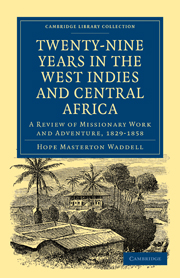 Twenty-Nine Years in the West Indies and Central Africa
Twenty-Nine Years in the West Indies and Central Africa Book contents
- Frontmatter
- Preface
- Contents
- CHAPTER I 1829
- CHAPTER II 1830, 1831
- CHAPTER III 1832
- CHAPTER IV 1832, 1833
- CHAPTER V 1834, 1835
- CHAPTER VI 1836, 1837
- CHAPTER VII 1837, 1838
- CHAPTER VIII 1838-1840
- CHAPTER IX 1841-1844
- CHAPTER X 1841-1845
- CHAPTER XI 1845
- CHAPTER XII 1846
- CHAPTER XIII 1846
- CHAPTER XIV 1846
- CHAPTER XV 1846, 1847
- CHAPTER XVI 1847
- CHAPTER XVII 1847
- CHAPTER XVIII 1847
- CHAPTER XIX 1847, 1848
- CHAPTER XX 1848, 1849
- CHAPTER XXI 1850
- CHAPTER XXII 1850
- CHAPTER XXIII 1850
- CHAPTER XXIV 1851
- CHAPTER XXV 1851
- CHAPTER XXVI 1852
- CHAPTER XXVII 1852
- CHAPTER XXVIII 1853, 1854
- CHAPTER XXIX 1855
- CHAPTER XXX 1856
- CHAPTER XXXI 1857
- CHAPTER XXXII 1858
- CHAPTER XXXIII 1858
- APPENDIX
- Plate section
CHAPTER XXIII - 1850
Published online by Cambridge University Press: 07 September 2011
- Frontmatter
- Preface
- Contents
- CHAPTER I 1829
- CHAPTER II 1830, 1831
- CHAPTER III 1832
- CHAPTER IV 1832, 1833
- CHAPTER V 1834, 1835
- CHAPTER VI 1836, 1837
- CHAPTER VII 1837, 1838
- CHAPTER VIII 1838-1840
- CHAPTER IX 1841-1844
- CHAPTER X 1841-1845
- CHAPTER XI 1845
- CHAPTER XII 1846
- CHAPTER XIII 1846
- CHAPTER XIV 1846
- CHAPTER XV 1846, 1847
- CHAPTER XVI 1847
- CHAPTER XVII 1847
- CHAPTER XVIII 1847
- CHAPTER XIX 1847, 1848
- CHAPTER XX 1848, 1849
- CHAPTER XXI 1850
- CHAPTER XXII 1850
- CHAPTER XXIII 1850
- CHAPTER XXIV 1851
- CHAPTER XXV 1851
- CHAPTER XXVI 1852
- CHAPTER XXVII 1852
- CHAPTER XXVIII 1853, 1854
- CHAPTER XXIX 1855
- CHAPTER XXX 1856
- CHAPTER XXXI 1857
- CHAPTER XXXII 1858
- CHAPTER XXXIII 1858
- APPENDIX
- Plate section
Summary
There is a village called Ebunda, about seven or eight miles from Creek Town, on a branch of the river that flows by Guinea Company. The people came originally from another part of the country, and maintain their own language and customs, mixed with those of Calabar. The chief died there, and ten slaves were put to death for him. Some people from our quarter, being there at the time, declared that such deeds were no longer lawful, being forbidden both by white men and Calabar; but the little colony smartly replied, that they were neither white men nor Calabar men, and would follow their own fashions.
That same evening a man was caught stealing at our house, and was tied up, till we should know what to do with him. His wife had been at Ebunda buying yams, and hearing on her return where her “goodman” was, came to beg him off. To engage our favour she told us what had occurred at that place, and got him home as her reward. We were indeed glad to get rid of him, even on her promise of his better behaviour. When we told the king, next day, the report that had reached us, he professed not to have heard, but promised to inquire; while, as we afterwards learned, he knew all about it. Mr. Thomson and I proceeded thither, therefore, to inquire for ourselves, accompanied by a messenger on his part.
- Type
- Chapter
- Information
- Twenty-Nine Years in the West Indies and Central AfricaA Review of Missionary Work and Adventure, 1829–1858, pp. 444 - 461Publisher: Cambridge University PressPrint publication year: 2010First published in: 1863
